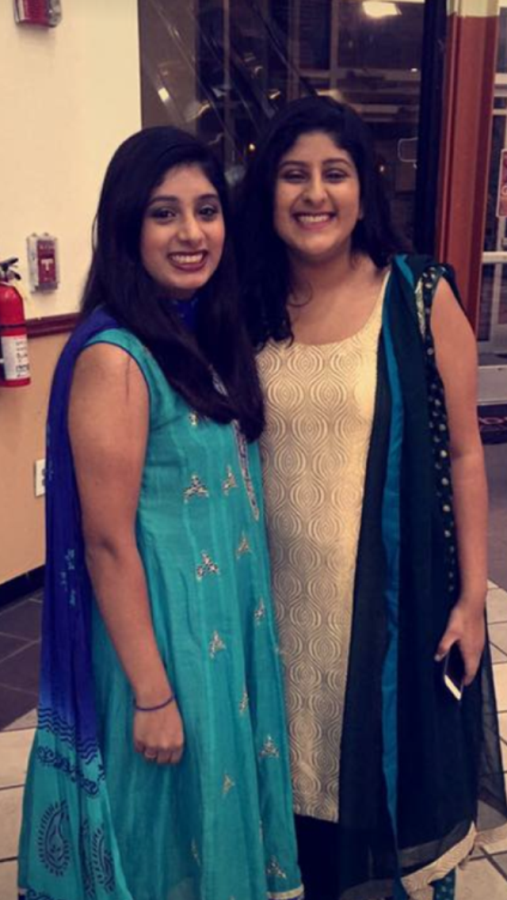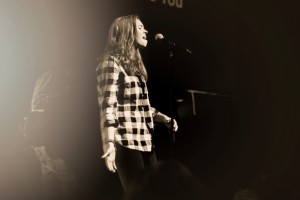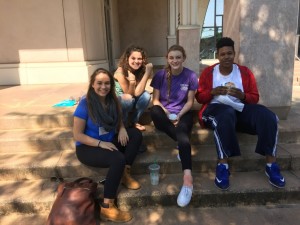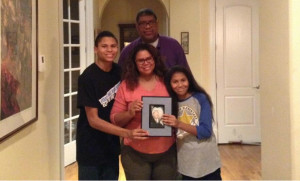Students play Garba for night of Indian culture and charity
Senior Arisha Ali and junior Aliza Ali smile with excitement in the Atlanta Global Mall lobby, ready to kick off Helping Organizations and People Everywhere’s first-annual Garba, wearing traditional shalwar kurtars and ready to introduce their friends to the culture.
January 20, 2016
After the hour and a half car ride north of Fayetteville, seniors Arisha Ali, Pamela Jew and Allie Merritt step out into the biting cold, running through the doors of the Atlanta Global Mall, ready to immerse themselves in a night of playing Garba. “I really wanted to embrace the [Indian] culture,” Merritt said.
This traditionally religious celebration originated in the Indian state Gujarat and “the words ‘playing Garba’ are really just the direct translation of dancing to the language Hindi,” Arisha said. Historically, the Hindu dance Garba celebrates Navrati, the celebration of the creation goddess Durga and is “played,” or danced, for nine nights.
The group of seniors attended the Helping Organizations and People Everywhere annual Garba event to support a worldwide cause in need. The colorfully decorated event took place in mid-December at the Global Mall in Atlanta.
HOPE describes themselves as “a group of friends getting the community together to help better all of humanity.” Although the specific names of these “friends” can’t be identified, their Facebook page states that their purpose is to provide year-round fundraising for causes in need. This past December, HOPE decided that their fundraising event for the month would be in the form of hosting a Garba.
Proceeds are collected through the entry fee and food and drink purchases with all profits donated to a cause of HOPE’s choosing. “This was our first Garba held by HOPE,” junior Aliza Ali said.
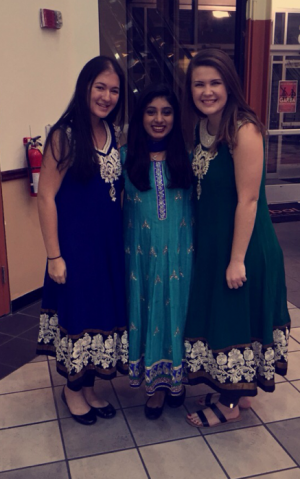
Seniors Allie Merritt and Pamela Jew pose with their friend who brought them to play Garba during mid-December. “It was a great and eye-opening experience where I met new people and participated in another culture,” Jew said.
The Ali sisters come from an Indian heritage, and Aliza said that her favorite part of the night was “introducing our friends to a new culture and letting them get to experience what we do on the weekends.”
Arisha said that getting dressed up in traditional Indian clothing, called shalwar kurtar, and taking Jew and Merritt out for a night of Indian culture made her evening memorable.
Another student, sophomore Sabeen Bardai, met up with the other Garba-goers in the Global Mall lobby. “I was looking forward to dancing and spend time with friends,” she said.
Among the attendees, Bardai also knew juniors Milani Patel and Aabir Khimani and Aabir’s younger sister, sophomore Tatmeen Khimani. Patel and the Khimanis rode together, and the trio went to “have a great time while contributing to a good cause.”
For most Garba-goers, one of the most important components of having a successful Garba depends on the playlist. The Ali sisters’ favorite songs included “Tunak Tunak Tun,” a fast-paced song with steady beats for swift dance moves, and “Dholida Dhol Re Vagad,” which has a more dreamy sound for traditional and graceful gestures like spinning and sweeping of the arms. Typically, dances have many repetitive and rhythmic components.
“Most of the songs played were from Bollywood,” Aliza said, “and ‘Dholida Dhol Re Vagad’ is often played at the traditional Hindu Garba.”
Considering himself as more of a novice Garba attendee, Khimani said that he isn’t ¨that great of a dancer,” but still decided to join in the festivities.
Merritt and Jew were wary of stepping out on the dance floor at first, but Merritt soon learned the tricks of the playing Garba trade. “When we first went into the room, it was intimidating to see the really good dancers, but after one of the older women came and taught us a few of the dances, it wasn’t as difficult,” Merritt said.
As the evening progressed, Merritt “felt the most accomplished when [she] figured out the fairly intricate ring dance. It became [her] favorite after [she] had mastered it.”
In order to help her friends of non-Indian background, Arisha guided Merritt and Jew in several dances to the best of her ability. “The traditional four-step Garba was pretty easy for them to pick up, and of course they knew the ‘Cupid Shuffle,’” Arisha said.
Jew didn’t catch on quite as quickly as Merritt, but, by the end of the night, she felt comfortable on the dance floor. “Learning the dances, I felt like I had two left feet,” Jew said, “but then after slowly stepping the moves out, I was able to come up to tempo with the other dancers.”
Following a group dance break, the event attendees were surprised by a performance from the professional dance group, Nashani, who have held first place two years straight at the United States Ismaili Games. “That was the first time I had seen them live,” Aliza said. “It was really exciting to be on the dance floor with such exceptional dancers.”
Hours later the clock struck 11 p.m., and the Mill’s Garba-goers all had flushed faces and achy feet. “I got pretty tired by the end of the night and the next day my feet and arms were sore from all the twists and turns,” Jew said.
Despite this, the group had a great time. “I definitely recommend other students have the Garba experience. It was a great way to dive into the Indian culture,” Merritt said.


